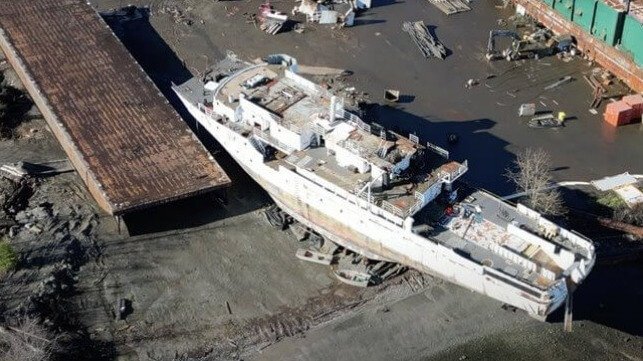Renewed Protests Against Deep Water Vessel Dismantling Site in BC, Canada

Residents of Union Bay, British Columbia in Canada have renewed their calls for the shutting down of a shipbreaking site where two former U.S. government research vessels are being dismantled. Supported by environmentalists, they are citing health, safety, and environmental concerns.
Calling themselves the Concerned Citizens of Baynes Sound (CCOBS), the residents are protesting against the shipbreaking site where Canadian company Deep Water Recovery (DWR) is dismantling the two vessels. The group recently sent letters to the federal, provincial, and regional authorities, asserting that the sites are not only hazardous but in violation of both national and international environmental and safety standards.
DWR is dismantling the former National Oceanic and Atmospheric Administration (NOAA) oceanographic research and survey vessels Miller Freeman and Surveyor at Baynes Sound. Built in 1967, the Miller Freeman was in NOAA service for close to four decades before it was decommissioned in March 2013 and was sold at auction in December 2013 for $337,550. In 2019, she was towed to B.C. for dismantling. Built in 1960, the Surveyor on its part was in NOAA service from 1970 to 1995.
Over the last three years, the two vessels have been undergoing dismantling at Baynes Sound, prompting anger from nearby communities and supported by the NGO Shipbreaking Platform they argue the ships are laden with hazardous materials including asbestos. The residents have repeatedly held protests against what they term as dirty and dangerous scrapping operations.
In their latest push for the shutting down of the site, the residents contend that government tests have confirmed the presence of known toxins such as lead and cadmium at concentrations 20 times above the provincial maximum allowable limits.
They also say that asbestos, a recognized carcinogen, has been confirmed on the premises, notably within the structure of the Miller Freeman, with a high probability existing in Surveyor, a much larger vessel.
The residents have been fitting against the company for years with the company in 2022 responding in a court case that individuals were “engaged in a malicious campaign" of trespassing and harassment, trying to shut down the business. They argue they comply with Canadian regulations to which the activists argue Canada must take a stronger stance at the national level.
The two U.S. vessels became their latest focus with the group arguing that the hazardous materials, as defined under the Hazardous Waste Regulation, are being mishandled, exposing workers, the surrounding community, and the environment to severe risks. Also, they are suggesting that discharge from the site is flowing into the ocean despite the BC Province rejecting DWR’s application in December last year to discharge into the ocean.
“The health, safety, and environmental risks currently posed by the shipbreaking operations in Union Bay are unacceptable. We urge you to take immediate action and shut down this hazardous waste site to protect our community, our environment, and the integrity of Baynes Sound,” states the CCOBS in its latest letter to government officials.
While Canada has no federal rules specifically regulating shipbreaking, the environmental groups want the country to ratify the Hong Kong Convention for the safe recycling of ships and not allow the beaching of vessels or ship recycling in ecologically sensitive areas.
Established in B.C. in 2016, DWR is involved in the salvage, dismantling, and recycling of marine vessels, barges, and railroad assets such as locomotives. In 2019, the company purchased a 111-acre property in Union Bay on the eastern shore of Vancouver Island near the Strait of Georgia that is a multi-zoned property that includes a 15-acre industrial marine site and a 27-acre water tenure specifically for vessel recycling.
No comments:
Post a Comment